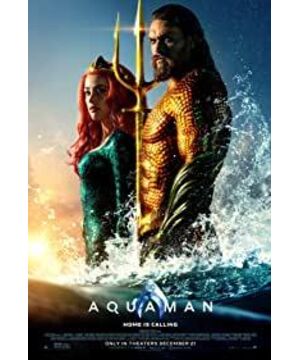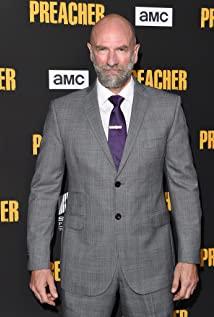In view of the fact that there are always self-talking friends in the comment area, the questions raised have basically nothing to do with my film review, so I re-statement: it is normal to hold objections, and it is no use to click and continue to mark five stars. If you want to refute , Then refute it after reading it seriously. If it is too long to read, and I have to go back to a paragraph to highlight the sense of existence, I will ignore it.
*********************************************
Rating: 2 out of 4
At the beginning, I said that "Aquaman" wanted to go out in the first 20 minutes was not an exaggeration, but this disgust was based on an ominous omen, and this omen was finally relieved. So if you have to jump to the conclusion from the beginning, then "Aquaman" is a very fan-friendly work. If you like Aquaman, especially DC, then you might like it.
As a reader of New 52 Aquaman is one of the DC Primer, I am afraid that Arthur will be portrayed as an image in the comics: Madonna, weak, and aggrieved. Humans violated the ocean excessively, and Om was deceived to initiate a land-sea war after his request for Arthur to return to the throne was rejected. This is the first time the Justice League has linked "The Throne of Atlantis" after the flashpoint restarted. The heroes gathered to defeat Aum, and Arthur had to deliver Aum to the human prison in order to calm the anger of the landers. But Aum in the comics is not a pure villain, he is indeed threatened by land; Arthur in the comics is not a pure hero, but a lost diplomat, a terrible politician; and the humans in the comics, and Human beings in reality are just as malicious.
The screenwriter Geoff Johns' story positions Arthur as a king without political skills, a leader who sits on the throne because of his blood. I am afraid that Arthur in the movie is the same, but it can be seen that it is not. Jason Momoa's Aquaman is strong, funny and hearty. Vico was washed white and became a good man, his pot (buying the black manta ray to attack Atlantis) was dumped to the thoroughly villainous Aum, and Aquaman became a well-deserved hero. There are a lot of eye-catching poses, spectacular lighting, and domineering close-ups-so if a person walks into the movie theater and just wants to see this humanized character, then Director Wen has completed his task. Every tens of minutes, Aquaman’s close-ups will shake their hearts again. My guess is that they must like this movie.
But it is difficult for the rest of the people. Most viewers want to see stories or special effects when they walk into the movie theater, but I want to see both when I walk into the movie theater. Superhero movies are becoming more and more year after year, and the term “assembly line” is already a commendatory term for Marvel. As viewers, we have to enjoy or endure the same two hours over and over again every year. Last year's "Wolverine 3" was praised by many friends as a masterpiece, I was puzzled to write a long review to question-because I think it is just a passing superhero movie. I wrote, "Discussing the quality of super-British films outside the circle of this genre is far from discussing the quality and value of films based on a more solid real-life foundation." This sentence is still effective. . But if we want to start serious discussions, then in these pipeline super-English films, two major standards are unchanged: one is the characters and background, and the other is the rhythm of the story.
Characters and background are not only the touchstone of movies, but also the touchstone of comics. However, in the short (relatively speaking) less than three hours of the movie, it is an efficient task to explain clearly the background and the character of the characters. The complex background should be fascinating and clear, and the image of the characters should quickly arouse the audience. The interest must also make them unforgettable for a long time after the movie ends. Even if this is an era when everyone will say "popcorn movies don't need a plot", it is not easy to achieve these two points. The counterexample of the former is a domestic animated film "Begonia" I recently watched. The counterexample of the latter can be explained by a sentence in the one-star and a half film review of "Thor 1" by Mr. Roger Ebert, " Do you remember the character Rocky six minutes after the movie ends?".
The background of "Big Fish and Begonia" is vague. I think it comes from the despair of the domestic animation industry. For a long time, the works have not convinced the public. When they finally got enough funds, the producers hugged this thigh tightly. It is a cash cow or a savior. All the elements that can embody Chinese culture are stuck in desperately: all kinds of legends, all kinds of gods, none of them are let go. The result is naturally a pot of porridge. We all understand the reason, less is more, more is less.
On the other hand, DC's situation is exactly the same as the despair of "Big Fish and Begonia". For a long time, the work has failed to convince the public, and they can only choose to overload the work. The background of "Aquaman" can be said to be a mess. I hadn't read "Justice League" before trying to piece together the background. Aum is about to declare war at the beginning. The inexplicable Mela, the seven undersea royal clans who flashed past without even seeing it, have anyone ever thought about why Aum would declare war, and whether Mela was too sloppy when she appeared on the stage. Do the seven royal families need care? The answer is that there is no way to think about it. Once the audience is not interested in the background, the movie is half a failure.
The confusion of this background explanation is precisely due to the overload of the content, which causes the audience to have no time to think about it. The Throne of Atlantis in the comics is a small linkage, and more than 90% of the linkages between comic publications are bad stories. However, out of the despair mentioned above, DC took two steps in this so-called "turning over" and made big news in a hurry. All the paving was for the special effects of the last few dozen minutes of the gala. Show, as for the details, you can save as much as you can. Some people say that "Aquaman" in the origin movie, which is generally unacceptable, is not bad. But Marvel’s origin movies, Iron Man, Captain America, Thor, which one is greedy enough to take out a big event to adapt, which one is not a relatively small format.
Then there is the rhythm of the story. Whenever someone utters the three words for watching the plot, there are always other fans who scoff at it. It's just a super British movie. The plots are not all the same. This is true, but the plot of a popcorn movie is often not only about what the story tells, but also how the story is told. Can the story quickly whet your appetite (as mentioned above), does the plot have priorities, is the climax proficient in the audience's psychology, etc., etc., are all aspects covered by the plot. My theory is that due to the special effects of Super British movies, the narrative strength is bound to be stronger. In order to control the strength and keep the force from being too strong, the rhythm must be considered, and the rhythm is no better than the priority of the narration.
A story that keeps your curiosity in the first 3/4 without letting it explode, and the accumulated tension is sprayed out in the form of a climax in the second 1/4. This is a good plot. But the climax of "Aquaman" was flooded, and I was numb after a few waves. At the beginning of the black manta ray, it didn't take long to roll the car in the sea, special effects, then the underwater world, special effects, and then the brothers singled out, cheers, special effects, special effects, special effects. The deafening sound effects and the black and heavy special effects (3D is particularly criticized here, very light-unfriendly) are desensitizing, and the fighting perspective is monotonous and not new. When Arthur arrived on the battlefield with the golden trident, I could hardly say that there was still Not paying attention to any one of them. Only when the brothers jumped out of the sea to fight again, the clarity of the picture picked up slightly, but the dark clouded background still made me ask, are they really still standing on this planet?
In addition, it can be said that the oasis-like springs are: the quick editing of Mela and Arthur when they escaped from Aum in a spacecraft. The perspective repeatedly switches between the global lens and the local lens, Arthur’s stalemate, and Aum’s glare. This is A technique often used in Hollywood blockbusters, although old-fashioned but effectively mobilized my heartbeat. There is also the chase scene in Sicily, the seamless transition between the Mellow Line and the Arthur Line, and sometimes even just a single shot is complete. There is also every scene in Atlanta that is tacky but reveals the warmth of mother and child affection.
All in all, the terrible viewing experience of "Aquaman" made me think that "Venom", which I only watched not long ago, is also a mediocre super British popcorn movie. Some people comment that "Aquaman" lacks depth, but I don't agree with it. To dig deep in a super British movie is tantamount to unfounded worries. But "Venom" is not only mediocre, but also shows the unconventional hero role of Eddie Brock and the conspicuous streamlined but skilled director skills in the car chase scene. And Wen Ziren's performance here is regrettable, I just think it's lackluster.
View more about Aquaman reviews











